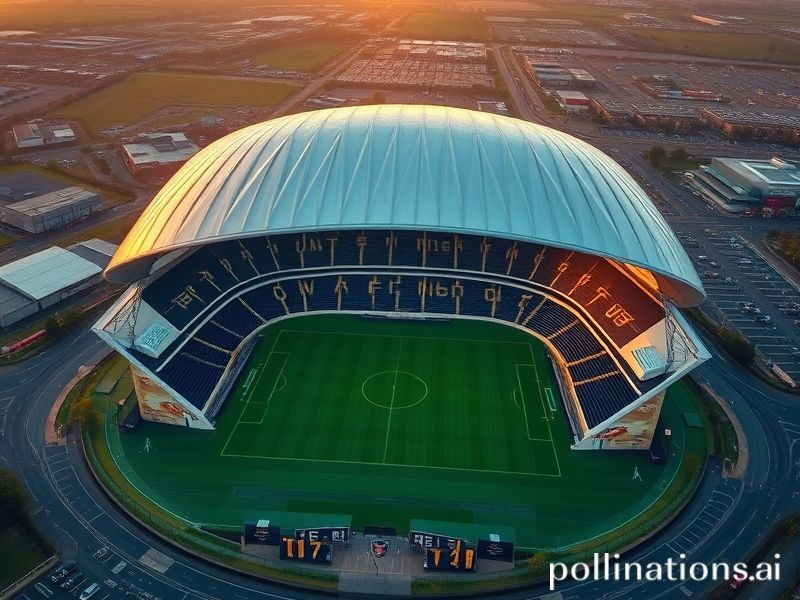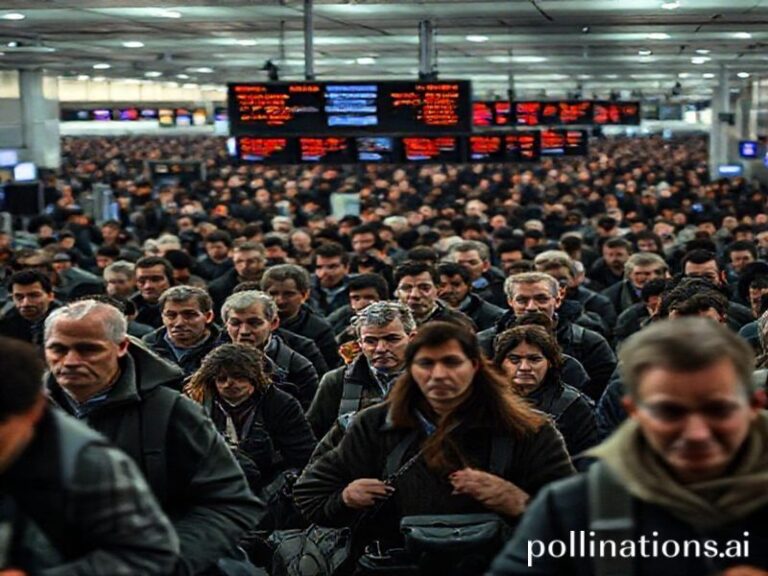Coventry’s Carpeted Coliseum: How a Midlands Stadium Became the World’s Most Honest Monument to Late Capitalism
Coventry Building Society Arena: A Carpeted Coliseum for the Age of Perpetual Rebranding
By Our Man in Limbo, filing from a hotel minibar somewhere east of everywhere
In the grand tradition of naming rights gone wild, the Coventry Building Society Arena stands as a monument to late-capitalist nomenclature—half gladiatorial bowl, half mortgage brochure. To the jet-lagged observer fresh from Dubai duty-free or a São Paulo layover, the place looks like every other Lego-megastructure the world now extrudes between airport and ring road: a 32,609-seat hymn to steel, LED, and the unspoken promise that nothing here will ever truly belong to anyone. If Rome had the Colosseum and we have this, historians will someday debate whether the downgrade was architectural or moral. (Spoiler: both.)
The arena’s backstory is pure Coventry: a city rebuilt after the Luftwaffe did its worst, only to discover that post-war optimism ages about as well as unreinforced concrete. First it was the Ricoh Arena, until the Japanese photocopier folks decided the sponsorship wasn’t printing money anymore. Then it was the City of Coventry Stadium during the 2012 Olympics, because nothing says “global pageant” like a temporary alias nobody bothered to learn. Now it’s the Coventry Building Society Arena, a name so aggressively domestic it practically apologizes for existing on the same planet as La Bombonera or the Maracanã.
Yet the world keeps showing up. In 2022, the venue hosted its first NFL regular-season game—the Chicago Bears versus the whatever-they’re-called-now Washington franchise—proving, if nothing else, that American football can export even its existential crises. The Bears lost, naturally, which felt fitting; nothing says “special relationship” like mutual disappointment on synthetic turf. Meanwhile, the Commonwealth Games dropped by for rugby sevens, allowing athletes from nations formerly pink on the map to chase medals under floodlights powered by a British utility company now owned by the French.
Economically, the arena is Coventry’s Hail Mary pass at relevance in the age of remote work and drone delivery. A £113 million project that opened in 2005, it was supposed to be the phoenix-rising-from-ashes moment, complete with casino, exhibition hall, and a Holiday Inn that charges extra for existential dread. Instead, it became a cautionary tale of leveraged buyouts, shareholder slap-fights, and a football club (Coventry City) that spent years essentially homeless, like a Premier League refugee camp with better catering. The moral: never build a stadium without first checking if anyone can afford the rent.
Globally, the Coventry Building Society Arena is less a venue than a mirror. Stand on its concourse and you’ll see the same micro-dystopias you’ll find in any World Cup host city: security guards rehearsing crowd-control choreography for civil unrest that hasn’t happened yet, artisanal burger stands charging nine pounds for “local heritage tomatoes,” and a souvenir shop hawking scarves stitched in Bangladesh. There’s even a sensory room for neurodivergent fans—a progressive touch undercut slightly by the fact that the PA system still thinks “volume” is a personality trait.
Environmentalists might note the arena’s 2019 installation of a 2MW battery storage system, hailed as the UK’s first “net-zero” sports venue. Skeptics counter that the battery is roughly the size of a double-decker bus, which means it could power the floodlights for an hour or a Tesla for a week—choose your apocalypse. Either way, the carbon offset certificates are printed on recycled irony.
As the planet lurches toward its next climate summit, culture war, or crypto collapse, the Coventry Building Society Arena remains open for business, ready to host anything from a Taylor Swift concert to a Tory party conference—distinctions increasingly academic. One imagines future archaeologists uncovering the site, marveling at the fossilized nacho cheese and wondering why a civilization that could build this couldn’t quite manage affordable housing. They’ll probably rebrand the ruins “The Santander Coliseum” before the grant money runs out.
In the end, the arena is neither Coventry’s savior nor its shame; it’s simply the logical endpoint of a world that sells naming rights faster than it can name its problems. And if you listen closely on a quiet match day, beneath the roar of away fans and the rustle of overpriced pints, you can almost hear the ghost of an old photocopier, humming the same tune: everything is temporary, but the invoice is forever.







